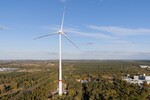News Release from windfair.net
Wind Industry Profile of
Sleep research confirms: No effects of wind farm noise detectable
Research on infrasound - sound with a frequency lying below the human hearing range which can occur anywhere in the environment - has been enriched by another chapter. While voices of opponents in Europe largely faded into the background recently due to the Ukraine war and the resulting energy crisis, the focus has been more on a rapid expansion of wind power.
This is different in Australia, where the areas used for wind energy expansion were usually so far away from the next residential area that there were hardly any possible complaints from residents to fear. But Australia, too, is now investing in the increased expansion of renewables, no longer wanting to rely solely on its fossil fuels such as coal. In addition, wind energy is the cheapest source of renewable energy on a large scale and numerous new projects are being planned.
Thus it is not surprising that the chapter of research into possible health risks from sounds (or 'noise') from wind turbines is now being expanded by a new study from Australia. However, researchers at the Woolcock Institute of Medical Research, which specialises in breathing and sleep, found no evidence of the existence of the so-called 'wind turbine syndrome', a condition that some believe affects people living near wind farms and is reputed to caused by infrasound, which is below the level of human hearing.
"We've been able to show conclusively that the infrasound generated by wind turbines doesn't make you dizzy or nauseous, doesn't impact heart health or mental health, or impact on sleep," says lead study investigator Associate Professor Nathaniel Marshall. "Uncertainty around the syndrome has cast a shadow over the future of wind farms as a clean energy source, so it's great to get such a clear result from the study."
People with wind turbine syndrome, on the other hand, explain that they suffer from headaches, dizziness and sleep disturbances, which they attribute to the turbines. Nausea, tinnitus and irritability are also among the symptoms repeatedly mentioned.
The researchers in Australia now used a new audio system designed by acoustic engineer Dr. Renzo Tonin. "The infrasound produced by the audio system matches the sound pattern recorded from operating wind turbines and is reproduced at a conservatively high level, equivalent to a wind turbine only 390 m away," says Tonin, explaining the study design.
For the study, 37 healthy "noise sensitive" adults were sought for three three-night stays each in the soundproof Woolcock sleep lab, exposed to either simulated infrasound from a wind turbine, no noise or traffic noise. However, since infrasound is not perceived by the human ear, participants were unaware whether infrasound or no sound was being played. Testing was carried out to monitor the volunteers’ sleep quality and duration, brain activity, symptoms, cardiovascular changes and neurobehavioral performance.

No sounds to be heard... (Image: Pixabay)
"None of the people exposed to infrasound developed what could be described as wind turbine syndrome," Associate Professor Marshall says. "There was no impact on sleep, brain functioning or cardiovascular or psychological health, so we think it's really improbable that wind turbine infrasound causes ill-health or sleep disruption."
The findings are consistent with the theory that wind turbine syndrome is caused by so-called nocebo effects, i.e. solely by a person's belief that exposure will harm them. The effects are usually attributed to psychological causes, thus people who are opposed to wind power are much more likely to suffer from wind turbine syndrome than people who are open to wind energy.
Australian researcher Professor Marshall therefore stresses the importance of his study: "We hope that such strong findings resulting from really robust research will help reassure people living near wind farms that the exposure is not impacting on their health in any measurable way."
- Author:
- Katrin Radtke
- Email:
- press@windfair.net
- Keywords:
- wind turbine syndrome, noise, infrasound, wind turbine, effect, health, nocebo effect, human health, sound, experiment, wind farm, Australia


























